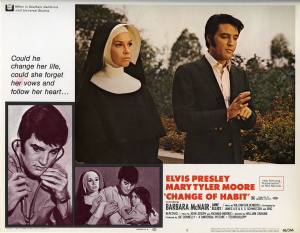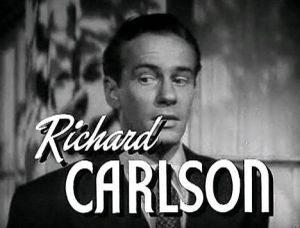 CHANGE OF HABIT (1969) – This review is in honor of Elvis Presley’s birthday. Change of Habit is a movie that was practically MADE to be ridiculed. You’ve got Elvis Presley, never exactly a master thespian, his sideburns, which out-perform him in this flick and Mary Tyler Moore as a nun torn between her vows and her growing attraction to The King.
CHANGE OF HABIT (1969) – This review is in honor of Elvis Presley’s birthday. Change of Habit is a movie that was practically MADE to be ridiculed. You’ve got Elvis Presley, never exactly a master thespian, his sideburns, which out-perform him in this flick and Mary Tyler Moore as a nun torn between her vows and her growing attraction to The King.
Elvis himself plays a doctor named John Carpenter (yes, like the horror film director), making his initials J.C., just like another famous Jewish carpenter … Jacob Cohen. Dr Elvis runs a practice in the ghetto, which should probably be rendered THE GHETTO instead, given the ham-fisted and stereotypical depiction of the neighborhood and its inhabitants.
Elvis’ character – if you can make it out behind his usual one-note performance – is supposed to be the perfect made-for-film physician: good looking, compassionate and willing to buck the system in order to help his patients. … And, of course, he sings.
Mary Tyler Moore’s Sister Michelle is accompanied by her sister nuns Sister Barbara, played by Jane Elliott in the years before she was a Soap Opera queen, and Sister Irene, played by African-American actress and singer Barbara McNair.
The Catholic Action Committee sends the trio of nuns to help out at Dr Elvis’ clinic so they go “undercover” by hiding the fact that they’re nuns and instead dressing and acting like “regular people”. They do this because they’re convinced the patients will trust them more if they don’t know that the three are nuns.
 While the title song (sung by Guess Who) is heard we get treated to an opening credits montage featuring shots of the three lovely ladies shopping for and trying on “civilian-issue female clothing” while suggestive shots of their legs, their smooth backs and their various female curves are shown. How can you NOT love such a joyously tasteless opening? Undercover Nuns would probably have been the re-release title of this flick if not for the fact that Elvis’ presence in the cast means it never needed any extra hyping.
While the title song (sung by Guess Who) is heard we get treated to an opening credits montage featuring shots of the three lovely ladies shopping for and trying on “civilian-issue female clothing” while suggestive shots of their legs, their smooth backs and their various female curves are shown. How can you NOT love such a joyously tasteless opening? Undercover Nuns would probably have been the re-release title of this flick if not for the fact that Elvis’ presence in the cast means it never needed any extra hyping.
The main story of the film involves the growing sexual tension between womanizing Dr Elvis and nurse/Sister Michelle since Elvis doesn’t know she’s a nun and just thinks she’s playing hard-to-get. For her part Moore is smitten with the compassion and (forced) humor that Dr Sideburns displays during his workdays at the clinic. Her feelings become strong enough to make her wonder if she should leave the convent and pursue her natural female attraction to The Man From Memphis.
I know, I know, there’s actually a good movie lurking inside all of that but because this flick came to us from the bizarre parallel universe that Elvis movies originate in it is instead an unintentional laugh riot. The ghetto clinic, its patients and all the figures in the surrounding ‘Hood are the type of hilarious caricatures that can only spring forth from the typewriters of lily-white screenwriters trying to make a movie seem “hip”, “with it” and “happening”. Maybe even “groovy” and “relevant”.
Among the cliches right out of Sociology 101: 1969-style we get the typical racist Black Panthers taunting Sister Irene (McNair) for supposedly “acting white” because she’s working as a nurse. Unfortunately this strange tableau of some African Americans implying other African Americans aren’t “authentic” continues to this very day especially in politics, movies and television. We also get the usual criminals both high and low-level, as well as hookers, pushers and children in peril.
 Ed Asner, Moore’s future Mary Tyler Moore Show co-star, shows up as an Italian cop who is simplistically depicted stifling street crime and easing ethnic clashes through his ability to speak Spanish. (Think of this film as Patronizing White People: The Motion Picture)
Ed Asner, Moore’s future Mary Tyler Moore Show co-star, shows up as an Italian cop who is simplistically depicted stifling street crime and easing ethnic clashes through his ability to speak Spanish. (Think of this film as Patronizing White People: The Motion Picture)
The nuns’ superiors in the church are also depicted in the same one-dimensional way as the rest of the characters and are just cardboard “establishment” figures frowning on Sister Michelle’s unorthodox methods. I was hoping for a scene featuring Moore in rogue-cop fashion, berating the Mother Superior, Father and Bishop by saying “You sit behind your desks all day – YOU DON’T KNOW WHAT GOES ON IN THE STREET!” No such luck.
The oddest part of the film comes when Dr Elvis and his Electric Sideburns use a then-fashionable treatment on an autistic child. The good doctor and Sister Michelle (in her undercover identity as “Michelle”) hold a child down while they scream and keep telling them that they love them over and over again.
Hilariously this works. Back then it was the scientific consensus among physicians that this sort of “rage reduction therapy” as it was called was helpful. In the movie it plays like an unfortunate cross between absurdist theater and child abuse.
Other figures who show up in the flick are:
 Richard Carlson, star of countless 1950s schlock-fests,
Richard Carlson, star of countless 1950s schlock-fests,
Ruth McDevitt, who played Miss Emily on Kolchak, The Night Stalker,
Ji-Tu Cumbaka, star of blaxploitation flicks as well as Roots and A Man Called Sloan,
A Martinez, who was the go-to guy for tough young Hispanic characters back then,
Lenny Montana, Luca Brasi himself, from The Godfather,
and Darlene Love, singer and co-star of the Lethal Weapon movies.
In addition to the title song Elvis sings Rubberneckin’, Have a Happy and Let Us Pray. That final song is belted out by Dr Elvis at a Folk Mass (LMAO) at the end of the film while Mary Tyler Moore’s Sister Michelle tries to choose between The King and the King of Kings. Who wins out? We never know. The movie gutlessly decides not to show us, ending wth Sister Michelle pondering the faces of Elvis and Jesus Christ as they each flash before her eyes.
For trivia buffs this is the only Elvis Presley movie in which you hear the words “faggot”, “nigger” and “bitch”, just in case it comes up on Jeopardy.
It also contains the notoriously awful Elvis Rape Joke. When Dr Sideburns meets his three new nurses he warns them about the neighborhood by telling them what happened to his previous nurses: “Two of them got raped. One of them even against her will.” No, I’m not kidding but I wish I was.
© Edward Wozniak and Balladeer’s Blog 2014. Unauthorized use and/or duplication of this material without express and written permission from this blog’s author and/or owner is strictly prohibited. Excerpts and links may be used, provided that full and clear credit is given to Edward Wozniak and Balladeer’s Blog with appropriate and specific direction to the original content.

Elvis jokes on his birthday?
Yep.
Even for Elvis movies this sounds weird.
It is. Hilariously so.
So funny! Loved this review!
Thank you.
Elvis could not pick movie projects could he?
No he couldn’t. I think he should have stuck just to westerns after awhile.
Pingback: That Time Godfather Cast A Real Mafia Enforcer To Play Luca Brasi
Logged.